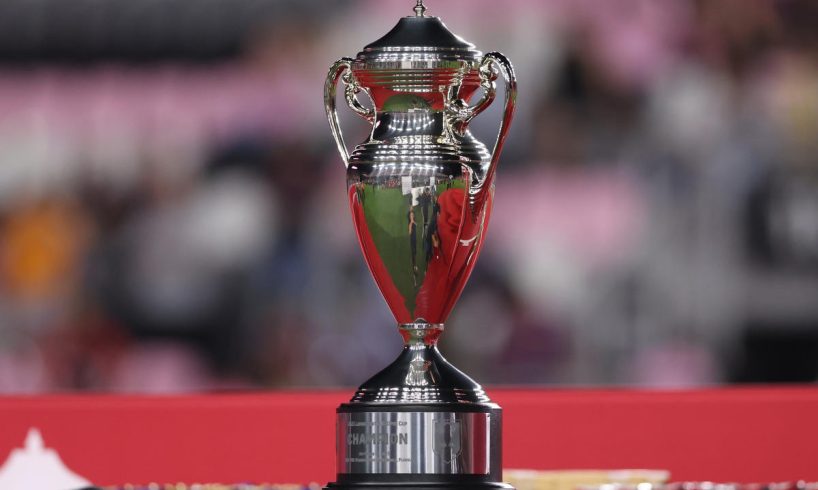
The Lamar Hunt U.S. Open Cup trophy. The tournament is the oldest in American soccer. (Photo by Megan Briggs/Getty Images)
After weeks of uncertainty and power struggle surrounding the U.S. Open Cup, the 2024 tournament is set to go forward, but perhaps with only eight MLS teams, United Soccer League president Paul McDonough told Yahoo Sports on Wednesday.
Two other sources with knowledge of the situation cautioned that the exact extent of MLS participation has not yet been finalized. But, after talks of potentially canceling the 2024 Open Cup altogether, the U.S. Soccer Federation — which owns and operates the tournament — has decided to forge ahead with it, as ESPN reported earlier this week.
Many USL clubs, however, aren’t happy. “It’s very emotional,” McDonough said in a phone interview. Some of the 47 who’ve qualified — 24 from the second-tier USL Championship, 12 from third-tier USL League One, and 11 amateur qualifiers from USL League Two — might choose not to participate “based on principle alone,” he said.
The Open Cup is America’s longest-running soccer competition, a century-old knockout tournament brimming with lore, akin to England’s FA Cup or Spain’s Copa del Rey. Around 100 men’s professional, semi-pro and amateur clubs enter or qualify each year. The lower-tier teams cherish and benefit from the opportunity to face MLS giants. Their occasional upsets are central to the Open Cup’s charm.
But in December, MLS owners voted to effectively ditch the 2024 edition, sparking outrage throughout the sport.
U.S. Soccer initially denied MLS’s request to enter reserve teams. “We thought this was put to bed in December,” McDonough said.
He and USL clubs were “caught off guard,” then, when a U.S. Soccer official called in late January to say that there’d be changes to the Open Cup format, and “we’re probably not looking at full MLS participation,” McDonough said.
U.S. Soccer and MLS had remained engaged in separate dialogue, which reached the tops of both organizations, sources said. USL understood and shared some of MLS’s frustrations with the financials of the Open Cup. Its relevance has lagged, dragged down by a lack of investment. It was a money-loser for most participating clubs.
But U.S. Soccer, McDonough and others said, had acknowledged this. The federation committed to upping its investment; to covering more travel costs than ever before. It outlined a 60/40 commercial split, where a home team would keep 60% of revenue from a game, and the other 40% would go toward Open Cup operations. Those were the subject of USL’s discussions with U.S. Soccer, McDonough said. And he felt that the federation was genuinely committed to seeking sponsors and broadcast partners that would boost the tournament as a commercial property long-term.
“They had done a really good job with the projections that they were showing us — and that was mid-January,” McDonough said. “The work we were doing with the staff was really good, and it was productive. It felt like a partnership.”
So his clubs felt wronged when it became apparent that MLS still wasn’t committed, and that U.S. Soccer seemingly wouldn’t hold MLS to the “Pro League Standards,” which state that, for a league to be sanctioned as a “first division,” all “U.S.‐based teams must participate in all representative U.S. Soccer and CONCACAF competitions for which they are eligible.”
“We’re really disappointed in the federation for not showing stronger leadership in this situation,” McDonough said.
He added that he also understood MLS’s concerns related to fixture congestion (a problem largely of MLS’s own making). If MLS wanted exemptions for its nine teams set to compete in the CONCACAF Champions Cup, a continental tournament, “I would’ve endorsed that, blessed it,” McDonough said. “Everybody else could’ve played.” Rules could’ve been tweaked to allow for call-ups from reserve teams. “That would’ve been the easy, less dramatic fix for me. And I think that would’ve been better for everybody.”
But to hear that likely less than half of MLS clubs would participate stung.
There’s a “strong group” of USL clubs that are “very passionate about the Cup, and the opportunity to play teams from outside [USL] — especially MLS teams,” McDonough said.
Some also bristled at the timing and suddenness of everything. The 2024 Open Cup actually began months ago, with qualifying rounds in September. “There are U.S. Open Cup rules, and there’s policies in place, and those are just kind of being abandoned right now mid-tournament,” McDonough said.
He and other USL executives have been in consistent communication with their clubs over the past few weeks. They held two board of governors meetings Tuesday. As of Wednesday morning, some were still deliberating. “We have some teams right now who are out. But I think we could have progress and give U.S. Soccer an answer [soon],” McDonough said.
“Even though none of them are happy, they understand the importance of the Cup,” he added. “But it’s a hard one, when you believe that you’ve been put into a situation that’s not great — do you let your emotions run wild? Or do you learn, discuss, and then make the best decisions for yourself and for the collective?”
There is no formal deadline for decisions, sources said. But the tournament’s first round is supposed to begin March 19 — in four weeks.
The most likely outcome, sources indicated, is that most USL teams will enter. MLS teams, on the other hand, could fall into three categories:
1. Eight of the nine CONCACAF Champions Cup qualifiers won’t participate in the Open Cup. The one exception could be the Houston Dynamo, who won the 2023 Open Cup, and would get a chance to defend their title.
2. A handful of MLS teams — selected based on where they finished in the 2023 MLS regular season — will participate in the Open Cup.
3. Other MLS clubs will send their reserve teams.
The situation remains fluid. But it now seems clear that MLS participation will be incomplete for the first time since 2012, when U.S. Soccer expanded the Open Cup field beyond 40 teams, to invite all professional teams, rather than forcing some to qualify.






